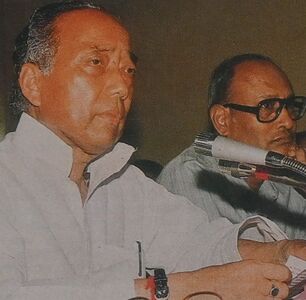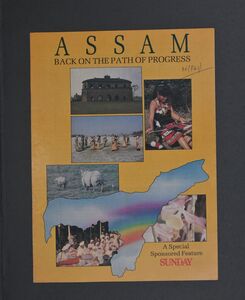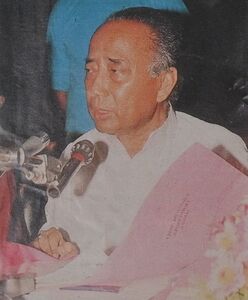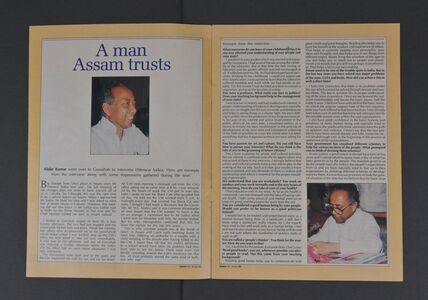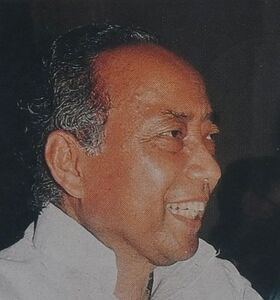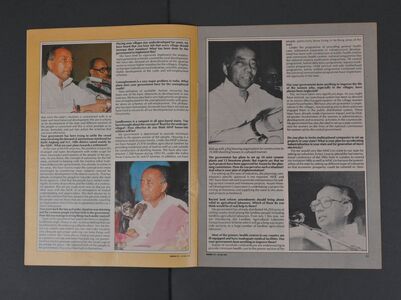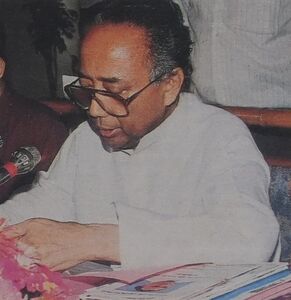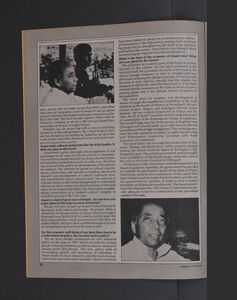Big changes have taken place in Assam since Mr Hiteswar Saikia took over. The full meaning of the changes does not seem to have reached all of us in Calcutta. So, I thought, this was the right time to do a special feature on Assam. When I approached Mr Saikia, he liked the idea and I was asked to meet him at Assam House in Calcutta. However, this meeting did not take place as Mr Saikia was called over to Delhi by the Prime Minister at that time and the Chief Minister invited me over to Assam instead.
I landed at Guwahati airport on June 20, a lazy Sunday afternoon. The rain had just stopped and the countryside looked lush and green. When the information officer who accompanied me to the government circuit house where I was booked rang up the CM's office, she was asked to take me over immediately. It was four in the afternoon and rest of Guwahati was enjoying a Sunday afternoon siesta. Mr Saikia and his office had no such minor pleasures! I was very impressed. The discussions were brief and to the point and the CM impressed me with his eye and ear for detail.
At 5.45 next morning I received call from the CM's office asking me to come over at 8.30. I was astounded by the hours of work the CM put in every day. Later I spoke to one the Black Cats who guarded him all day. He told me the CM worked from 5 a.m. to midnight every day that covered five Black Cat rotations. I thought I had made a discovery but the Governor, Mr M.L. Mishra said it was common knowledge all over Assam that the CM worked 16 hours a day on an average. I mentioned this to Mr Saikia when I went over for breakfast with him, he merely smiled. But his wife, Hemaprabha confirmed that this has been the routine for the last few years. This is why common people rise at the break of dawn in Assam and catch early morning buses to meet him. Offering an umbrella to a couple with a child standing in the drizzle after having failed to see the CM, I learnt they felt that the child's admission to a school would have been no problem had they been able to see Mr Saikia. There were over 250 people crowding around the CM's residence on that day, all most probably shared the same kind of faith; and why not?
Excerpts from the interview
What memories do you have of your childhood? Has it in any way affected your understanding of your people and your state?
I was born in a tea garden which was owned and managed by Europeans. I had several friends among the children of the labourers. But at that time the free mixing of labourers and tea garden officers was not encouraged at all. It reflected upon my life. As I had developed some socialistic thinking in my childhood, I could not appreciate this classification. I was pained to learn that the labourers suffered hardship and want while we had plenty at our table. For this reason I had decided at a time to remain a vegetarian, giving up the luxuries of eating.
You were a professor. What made you turn to politics? Does your teaching background help in the management of your state?
I was teacher in history and had studied with interest. A proper understanding of historical development naturally gives you an insight into the turn of events and tendencies and helps in seeing things in a clearer light. My own shifting to politics from the profession of teaching was basically because of my interest and active involvement in the public affairs of my own state. I visualised politics as a means to ensure my own involvement in the process of development of my own area and subsequent widening of my field of activities to cover the whole state has been something that has happened without my own asking for it.
You have passion for art and culture. Do you still have time to pursue your interests? What do you think is the role of arts in the grooming of future citizens?
Yes, I have a passion for artistic and cultural activities but my interest is confined basically to appreciation and enjoyment of these in my own way. I strongly believe that artistic and cultural pursuits have a vital role to play in the making of the society. Such activities give youths a more positive outlook and also stimulate in them a creative and constructive zeal which is essential for the proper moulding of personality.
We understand that you are workaholic? You work on Sundays and your work normally end in the wee hours of the morning. How do you take of care of your health?
I find relaxation only in my work. As far as my health is concerned, I am not obsessed with the idea of having radiant health. I take some physical and mental exercise to keep me going and the passion for work does the rest.
You are considered a good human being by your people. Would you prefer to be known as a good politician instead?
I would like to be treated and remembered more as a normal human being than as a politician. I still don't know what a 'politician' really means; for I, for myself, have tried to live and work only as a human being. I feel and react to any situation as any human being will do and I am not sure where the borderline of politics starts or starts at all!
You are called a 'people's thinker': You think for the masses. How do you react to this?
Yes, I do think for the people. Everyone does. Don't you? "Read good books", you say, whenever possible you advise people to read. Has this come from your teaching background?
Reading good books helps you to communicate with great minds and great thoughts. Reading also helps you to have the benefit of the wisdom and experience of others. That helps in correctly shaping your personality, your ideas and thoughts and also helps you to see things from different angles. Books bring the wisdom of the ages to you and helps you to reach out to people and places, minds and moods that you will not perhaps meet otherwise. That helps a lot in your own making.
Assam used to be one of the trouble spots in India. But in the last two years you have solved two major problems of the state: ULFA and Bodo. How did you achieve this in such a short time?
I have firm conviction that there is no problem under the sun which cannot be solved through sincere and honest efforts. The key to solution lies in proper understanding of the issue in question. Once we see beyond the out-ward manifestation and locate the basic issues, half the battle is won. You must have noticed that the basic issues, on which the popular support base of the two organisations you have referred to had been built up, have already been taken care of and that has led to self-introspection by the sensible section even within the said organisations. I also have great confidence in the basic honesty and goodness of every human being and naturally tried to wean away the youths who think rationally from the path of agitation and violence. I won't say that the two problems have been solved already and fully. I treat the recent breakthrough only as the beginning of the process of settlement of the said problems.
Your government has visualised different schemes to help the various sections of the people. What prompted you to think of devising these schemes?
In our system, a government is elected for a term of five years and I cannot afford to waste even a day of what has been given to us by the people. The mandate given to us, by the people basically reflects the people's expectations from us and we have naturally tried to live up to their expectations by initiating different schemes of development for them. It is true that our priorities include the general situation of the state but we believe that the basic issue that even the state's situation is concerned with is of faster and more balanced development. We are in a hurry so far development of the state and different sections of the people is concerned and this is what prompts us to devise, formulate and put into action the schemes that you have referred to.
Your government has been trying to settle the vexed issue involving the demand of autonomous statehood for Karbi Anglong and N.C.Hills district raised mainly by the ASDC. What are your plans towards a settlement?
In the case of the hill areas too, the problem is basically of proper and faster development with wider scope for more meaningful participation of the people in the pro-cess. As you know, the concept of autonomy for the hill areas, evolved in keeping with the timeless tribal traditions of democratic governments, has already in action in the areas. We have tried to make the concept even more meaningful by transferring more subjects covered by democratic development to the district councils. That has already prompted the people to consider anew the need for an agitation. I feel that the people have started realising the sincerity of our efforts and the futility of a continued agitation. But we are ready even now to discuss any other issue with the ASDC in an atmosphere of mutual understanding and appreciation. We shall always try to go for the solution that best answers the genuine needs of the people and not those that are conveniently raised by an organisation which believes in agitation politics as a short cut to power.
Two years back the law and order situation was alarming and the common people had lost faith in the government. How did you manage to bring things back under control?
I look at the question of law and order from a completely different angle. Peace, to me, is not something that can be enforced by the enforcing authority alone. Yes, the forces can contain and control any law and order situation and adequate and proper policing can keep things well under control. But I have always tried to see peace more as a positive concept and more than policing, my government has tried to generate and stimulate the innate urge of the people for peace. The renewed faith of the people in the government, thus is but their faith in themselves.
Having seen villages stay underdeveloped for years, we have heard that you have felt that every village should increase their man-days? What has been done by the government to implement this?
We have tried to vigorously implement the employment generating schemes covered by rural development. We have also stressed on diversification of the agrarian sector to ensure higher man-days for the villagers. Emphasis has been laid also on rural industries, scientific and profitable development of the crafts and self-employment schemes.
Unemployment is a very major problem in India. What plans does your government have for the unemployed youth?
Non-utilisation of available human resources has been one of the basic deterrents to development in our state too. We have attached a very high priority on generation of employment for the unemployed youths with greater stress on schemes of self-employment. The philosophy has been formulated, the trends have been set and we have tried to reconcile all our developmental activities to this priority.
Landlessness is a rampant in all agro-based states. You have brought about the concept of 'Roof for the underprivileged'. How effective do you think MNP house-site scheme will be?
My government is determined to provide minimum needs to the poorer section of the people. Housing is a minimum need of a poor family. Under the MNP scheme, we have helped 25,978 landless agricultural families by providing residential plots of land as well as cash subsidy for construction of dwelling houses. We have also constructed 2,268 houses during 1992-93, under the Indira Awas Yojana for SC and ST families. In addition, we have tied up with a big housing organisation for construction for 10,000 dwelling houses in a phased manner. The government has plans to set up 10 mini cement plants and 13 limestone plants. But experts say that no such projects have been approved for Assam by the Planning Commission.
How do you perceive such a situation? And what is your plan of implementation? For setting up this type of industries.
If planning com-mission's specific approval is not required. AIDC and AFC have been advised to promote entrepreneurs for setting up mini cement and limestone projects. Assam Mineral Development Corporation is undertaking a project for mining of limestone and supplying the same to the afore-said projects as feedstock. Recent land reform amendments should bring about relief to agricultural labourers.
Which of these do you think would be of real help to them?
My government has already distributed 44,203 acres of ceiling surplus land among the landless people including landless agricultural labourers. From July 1 this year, we are introducing the Landless Agricultural Labourers Group Insurance Scheme which will go a long way to provide security to a large number of landless agricultural labourers. Most of the primary health centres in our country are ill-equipped and have inadequate medical facilities.
Has your government done anything to improve these?
In spite of manifold constraints, we are endeavouring to provide minimum health care to the poorer section of the people, particularly those living in far-flung areas of the state. Under the programme of providing general health care, substantial expansion in infrastructural development has been with construction of public health centres and community health centres, national programmes like the national malaria eradication programme, TB control programme, Iodine deficiency programme, leprosy eradication programme, child survival and safe motherhood programme, family welfare programme combined with the universal immunisation programme have implemented vigorously in the state.
Has your government done anything to improve the life of the women who, especially in the villages, have always been neglected?
Yes, we have taken very significant steps. As you might have noticed, our panchayat system has been so devised as to ensure effective participation of the village women in panchayat bodies. We have also set up women's cooperatives in the villages, sanctioned grants to them and even engaged them in the public distribution system. These 'steps have already made. impressive impact and facilitated greater involvement of the women in administration, development and economic activities in the countryside. My government has also decided to set up a state commission for women on the lines of the national commission for women set by the central government.
Do you plan to invite multinational companies to set up projects in your state? What is your plan for accelerating industrialisation in your state and for generation of more electricity? 2
Yes we would very like MNCs to come to our state for setting up industries. In fact, I was to attend the last international conference of the NRIs held in London to extend my invitation NRIs as well as MNCs to harness the potentialities of the state by setting up different types of industries so that economic prosperity could be ushered in. Similarly, we are also very keen to see that MNCs and other international companies come to Assam to set up power projects utilising natural gases and water resources available in the state. We have already signed a MOU with an American company to set up a 360 mw gas-based thermal project at Amguri in Upper Assam. Probably you are aware that with a view to providing incentives to the entrepreneurs, the Union finance minister has declared a tax holiday to industries set up in the north-eastern and other backward areas and power projects throughout the country.
Assam lacks cultural institutions like the Kala Kendra. Is there any plan on this front? Government policy envisages encouragement of and patronage for all types of cultural activities in the states.
You must have already heard of our project for the Sriman-ta Sankardeva Kalakshetra which is under way. We have also evolved a film policy for development of this powerful medium. The schemes for grants to cultural organisations, scholarships and stipends to budding talents and research and development of cultural traditions have also benefitted the state's cultural world. The network of cultural centres is also being strengthened to make them effective as nerve centres of cultural activities in the rural areas. At my instance the Indian Tea Association is under-taking construction of a modern cultural complex in Guwahati at a cost of Rs 5.50 crore.
Assam is a land of great natural beauty. Do you have any major plans for the improvement of tourism?
We are very keen to open up Assam's natural bounty to the tourist, both Indian and foreign. At present, there is restrictions on foreign tourists in Assam who have to get a Restricted Area Permit (RAP) in order to visit the state. We have requested the central government to liberalise the system of RAP. We have taken up different types of activities for promotion of tourism in the state as well. For the economic well-being of any state there has to be a solid industrial policy. Do you have such a policy?
Yes we have already announced our new industrial policy for the state in 1991 which provides for various growth-inducing incentives as well as steps for removal of infrastructural deficiencies. The new policy aims at encouraging growth and promotion of industries in Assam based on local resources and the local environment to the maximum extent possible. Liberal incentives have been offered to attract local entrepreneurs, industrial investments in the state and according much emphasis has been laid on strengthening the small scale industries and handicrafts sectors. These efforts have brought about an encouraging response from the entrepreneurs.
What is the state of the economy of Assam now? What are your plans for the future?
The economy of a state is a part of the larger economic structure of the country. As has been witnessed at the national level, the economic structure of the country has shown enough resilience to take 'in changes and new directions sweeping the global economy. It was basically because of such intrinsic strength that the country has adopted so well to the new liberalised policy. It has been realised that the pressures on the state economy is only a passing phase and it has already shown symptoms of recuperation. The future plans for progress and development of Assam envisage the expeditious completion of the work of setting up the fourth oil refinery at Numaligarh, the gas-cracker project, Amguri and Kathalguri thermal power projects, the two central universities at Tespur and Silchar, the IIT at North Guwahati and the ongoing project of construction of the Brahmaputra bridge at Jogighopa. The fourth bridge over the Brahmaputra at Bogibeel near Dibrugarh will also be taken up in right earnest after the completion of the bridge at Jogighopa. The central government has also agreed to construct a cable-stayed bridge over Brahmaputra connecting Guwahati with North Guwahati via Umananda. The future plans also envisage the construction of Subansiri, Dihang and Barak River Valley projects, besides making the inland container depot at Amingaon a full-fledged dry port. The central government assured expeditious completion of the broad gauge extension work of the railway line from Guwahati to Dibrugarh. On the basis of the unanimous resolution passed by the Assam Legislative Assembly, the government has decided to establish the permanent capital of the state at Dispur. Preliminary work for the construction of the capital have been initiated and the matter has been taken up with icentral government for sanction of funds so that a modern township could be built expeditiously. The Assam government has requested the 10th Finance Commission to pro-vide adequate funds for construction of the permanent capital in the state.
Thank you Chief Minister.

